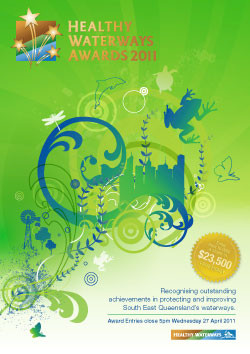Celebrating Success: Healthy Waterways Awards
Bill Dennison · | Applying Science |Environmental news is typically bad news. It is focused on negative aspects of human impacts on the environment, and often accompanied with dire predictions about the future. This propensity for dire predictions has been called the 'Cassandra syndrome', referring to Cassandra from Greek mythology who was cursed with the ability to foretell the future but nobody would believe her warnings. There is a good book entitled "Believing Cassandra: An optimist looks at a pessimist's world" by Alan AtKisson (1999) describing this syndrome in environmental terms.
As an antidote to chronic environmental bad news, a celebration of environmental success is conducted each year with the Healthy Waterways Awards in Southeast Queensland. Nine awards are given each year for the best environmental practices, with different sponsors for each award. There are awards for water sensitive urban design, research, government, rural, industry, community, clean up, education, waterways champion. In addition, a Ministers Grand Prize, worth $A10,000 is awarded to the most innovative category winner. These awards are worth a total of $A23,500 and are awarded at a gala event, well attended by civic leaders and members of the broader healthy waterways community. This year, the event will be on June 22. Heathy Waterways recently announced that the 2011 entries were now open until April 27.
Celebrations are an important facet of human life. They help emphasize the things that are important to us. It is a rather unique feature of the Healthy Waterways effort in Southeast Queensland that these annual celebrations of best practices take place. My Marine Botany research group at the University of Queensland was the co-recipient of the research award in 2001, and it was a wonderful and memorable moment.
The creation of the Healthy Waterways awards actually followed the creation of the International Riverprize, the annual award sponsored by the International River Foundation since 1999 and awarded at the annual International River Symposium. After awarding the International Riverprize to recognize international best practice, a national Riverprize was initiated to celebrate best practice in Australia and the Healthy Waterways prizes initiated to celebrate best practice in Southeast Queensland.
While all the prizes awarded (international, national and Healthy Waterways) carry a cash value with them, it is not the monetary value that is most significant. The most significant thing that these prizes offer is recognition--recognition from your peers that your group is doing the right thing. For example, how many people know the monetary value of the Nobel Prize? The recognition factor can buoy a hard working group, inspire others to emulate these successes, and help formulate a code of practice by identifying those attributes of a program that are worthy of attribution.
One of the more difficult jobs in awards of this sort is judging. I served as a judge for the International RiverPrize for many years, and I found the challenge of choosing just one worthy recipient out of many a difficult choice. This was made even more difficult when divergent sorts of programs were being compared. But the judges take their task extremely seriously, and the merits of each finalist carefully considered. Many of the winners have applied multiple times and worked to improve their program and their nomination each successive application until they were successful.
It will be interesting to see the Healthy Waterways awards this year, and to track the media coverage. The media often focuses on only bad news, and the good news stories associated with these celebrations can be relegated to a cursory mention, or completely ignored by major media outlets. I hope that celebrations of people who overcome obstacles, apply their energy and creativity to environmental problems, and are given accolades by their peers and the civic leaders is worthy of media coverage. We all need to hear about what is working well and want to help celebrate those people and groups of people who are making waterways healthy.
About the author
Bill Dennison

Dr. Bill Dennison is a Professor of Marine Science and Vice President for Science Application at the University of Maryland Center for Environmental Science.
